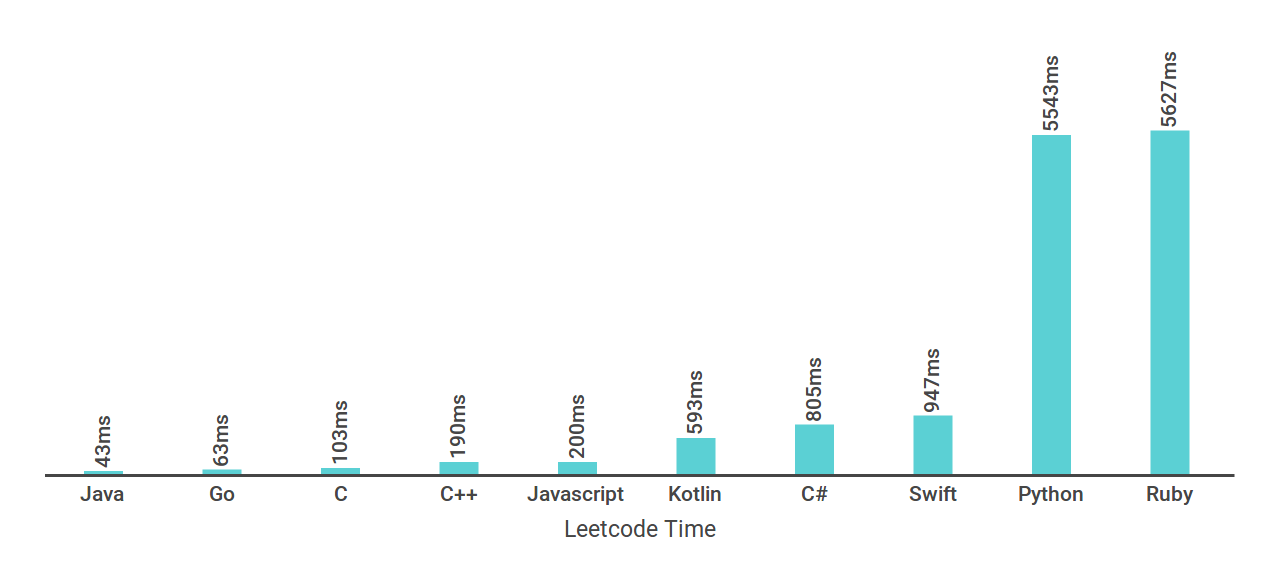折腾一个Two_Sum(上)
11 Jan 2018Two Sum题干:
Given an array of integers, return indices of the two numbers such that they add up to a specific target. You may assume that each input would have exactly one solution, and you may not use the same element twice. Example: Given nums = [2, 7, 11, 15], target = 9, Because nums[0] + nums[1] = 2 + 7 = 9, return [0, 1].
两层for循环,最天真,是因为时间复杂度最高O(n2),但是不能忘它是空间复杂度最低的O(1)。但是最天真的遍历不代表它没什么好折腾的。可以换语言写写。
C++解一:
class Solution {
public:
vector<int> twoSum(vector<int>& nums, int target) {
vector<int> result;
for (int i=0; i<nums.size(); ++i){
for(int j=i+1; j<nums.size(); ++j){
if( nums[i]+nums[j] == target ){
result.push_back(i);
result.push_back(j);
return result;
}
}
}
throw std::invalid_argument("No solution");
}
};Performance: 190ms
Python2.x/3.x解一:
class Solution(object):
def twoSum(self, nums, target):
"""
:type nums: List[int]
:type target: int
:rtype: List[int]
"""
for i in range ( 0, len(nums) ):
for j in range( i + 1, len(nums) ):
if nums[i]+nums[j] == target:
return [i, j]
raise ValueError("No solution") Performance: python2 5543ms / python3 time out
Java解一:
class Solution {
public int[] twoSum(int[] nums, int target) {
for (int i=0; i<nums.length; i++){
for (int j=i+1; j<nums.length; j++){
if (nums[i]+nums[j] == target){
return new int[] { i,j };
}
}
}
throw new IllegalArgumentException("No solution");
}
}Performance: 43ms
C解一:
/**
* Note: The returned array must be malloced, assume caller calls free().
**/
int* twoSum(int* nums, int numsSize, int target) {
static int result[2] = { -1,-1 };
for(int i = 0; i < numsSize; i++)
{
for(int j = i+1; j < numsSize; j++)
{
if(nums[i]+nums[j] == target)
{
result[0] = i ;
result[1] = j ;
return result;
}
}
}
return NULL;
}Performance: 103ms
C#解一:
public class Solution {
public int[] TwoSum(int[] nums, int target) {
for (int i=0; i<nums.Length; i++){
for (int j=i+1; j<nums.Length; j++){
if (nums[i]+nums[j] == target){
return new int[] { i,j };
}
}
}
throw new ArgumentNullException("No solution");
}
}Performance: 805ms
Javascript解一:
/**
* @param {number[]} nums
* @param {number} target
* @return {number[]}
**/
var twoSum = function(nums, target) {
for (var i=0; i<nums.length; i++){
for (var j=i+1; j<nums.length; j++){
if (nums[i]+nums[j] === target){
return [i,j];
}
}
}
throw new Error("No solution");
};Performance: 200ms
Ruby解一:
# @param {Integer[]} nums
# @param {Integer} target
# @return {Integer[]}
def two_sum(nums, target)
nums.each_with_index do |num1, i|
nums[i+1..-1].each_with_index do |num2, j|
return [i, i+j+1] if num1 + num2 == target
end
end
return "No solution"
endPerformance: 5624ms
Swift解一:
class Solution {
func twoSum(_ nums: [Int], _ target: Int) -> [Int] {
var result = [Int]()
for i in 0..<nums.count {
for j in i+1..<nums.count {
if nums[i] + nums[j] == target {
result.append(i)
result.append(j)
return result
}
}
}
return result
}
}Performance: 947ms
Golang解一:
func twoSum(nums []int, target int) []int {
for i := 0; i < len(nums); i++ {
for j := i + 1; j < len(nums); j++ {
if nums[i] + nums[j] == target {
return []int{i, j}
}
}
}
return nil
}Performance: 63ms
Kotlin解一:
class Solution {
fun twoSum(nums: IntArray, target: Int): IntArray {
for( i in 0..nums.size-1){
for( j in i+1..nums.size-1){
if(nums[i] + nums[j] == target){
return intArrayOf(i,j)
}
}
}
return intArrayOf()
}
}Performance: 593ms
Home Studio不专业分析:
蛮无聊的吧,每个代码我都尽力让他们相近了,Ruby, Swift, Golang和Kotlin全部都不懂异常,就被我忽悠了。
过去学语言都掉进了语法这个白痴的误区里,我现在问我自己它们之间有啥各自的语法特性和优劣,我根本就说不出来,很衰。
所以唯一的意义是温习了一遍语法,不过我把它们都送到Leetcode里去运行了,从过去有限的刷题经验上看各种语言的测试集是一样的。
整理了它们的运行时间绘制了一张图。

关于正式的计算机语言Benchmark看 The Computer Language Benchmarks Game 。
图和Benchmark比较,除了Java和Go快的不正常,C++看起来有点慢,但是不知道编译器,Python真是不济,其他排序还挺理性。我想,
-
Leetcode里的
Java和Go,不管它是什么,但应该不是CPU运行时间。 -
Python3直接Time Out,在单独的手动测试集上Python3竟然比Python2慢将近一倍。这个真意外。
关于这篇博客一些有意思的东西:
-
这是我fork Hyde 后修改的一个
Github Page -
博文是我在 Vim 里搭配插件 livemark.vim 直接码的,目的是熟悉下 Jerkll 的
Markdown -
图表是在 Infogram 里生成的
-
题目和测试都是在 Leetcode 上进行的,用了 Leetcode-cli 把代码本地化
-
期间把 阿狗 忘记,以至于它被泡在洗衣粉里一晚
-
一直单曲重复
Luca Brasi的 Theme Song from Hq -
发现Markdown定义的符号里嵌套html的tag会失败,这样的
O(n<sup>2</sup>)和 O(n2)
如果有建议,观点或者问题的话,可以给我发邮件aileen365@gmail.com,因为我还不知道该怎么在静态网页里设留言板,有主意欢迎告诉我。